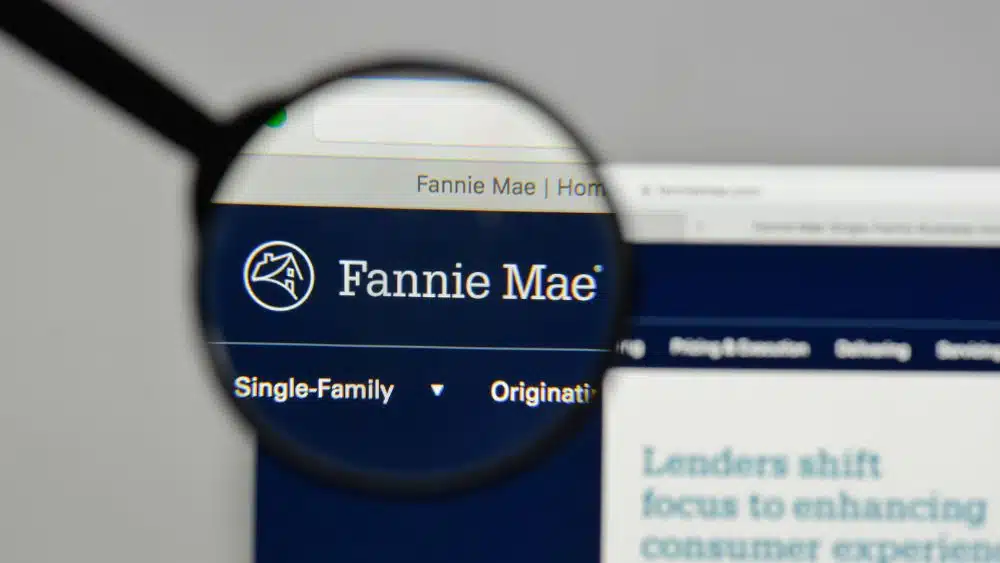Variable versus fixed, short versus long-term, and conforming versus non-conforming – when you’re wading through your options for a mortgage, the choices may seem daunting.
Residential mortgage debt in the U.S. totaled $11.18 trillion in the first quarter of 2022, according to the Federal Reserve Bank of New York. Americans’ first mortgages reached a record high of $298,324 in 2021 while the average monthly payment is roughly $1,889, the Mortgage Bankers Association says.
Essentially, your mortgage will eat up a lot of your monthly budget for years to come! The New York Fed suggests home loan payments account for 71 percent of combined household debt in 2022. But did you know the type of mortgage you opt for and the terms you set it up under will shape what your monthly payments will look like and how long you may be servicing your home loan debt?
If you’re wondering what the difference is between conforming and non-conforming loans, like jumbo loans, we’ve got you covered. Here’s a look at the key disparities between the two and how you can decide which is the best route to take for your home purchase.
What are conforming loans and non-conforming loans?

In a nutshell, conforming and non-conforming loans are one of the most common ways to classify mortgages.
To break away from the jargon, a conforming loan is a more common way to borrow cash to buy a home, while non-conforming loans are less popular.
Either way, your home loan will fall into one of these two categories, and which one you opt for comes with a handful of pluses and minuses to be cognizant of.
What are conforming loans?

Conforming loans meet the standards set by Fannie Mae and Freddie Mac, alongside the annual regulations set out by the Federal Housing Finance Agency (FHFA).
The Federal National Mortgage Association (FNMA, or Fannie Mae) and the Federal Home Loan Mortgage Corporation (FHLMC, or Freddie Mac) are government-sponsored entities – ultimately, they’re the largest purchasers of mortgage loans. To be clear, your conforming loan will be issued by a lender, bank, or mortgage broker while Fannie and Freddie are in the background.
Simply put, Fannie Mae and Freddie Mac buy up conventional mortgages provided by your everyday lenders, freeing up their cash to offer more loans so Americans can afford to buy properties.
Both entities outline their baseline standards to qualify for a conventional loan, including maximum mortgage loan limits, credit score requirements, debt-to-income ratios, and minimum down payment thresholds.
What are the conforming loan requirements?
Because Fannie Mae and Freddie Mac tend to buy up conforming loans, they have a list of criteria mortgages must meet, including:
- Maximum loan limits: To start, the FHFA, which regulates conforming loans, dictates loan limits each year. For 2022, the standard loan limit is $647,200 for a single-family home. If you’re living in a “high-cost loan area,” the limit increases to $970,800. You can check out loan limit values by state and county on the FHFA website.
- Minimum credit score: 620
- Maximum debt-to-income ratio: 43 percent (which is standard for qualifying for a conventional home loan)
- Minimum down payment: At least 3.5 percent (however, you’ll need a down payment of at least 20 percent to avoid buying private mortgage insurance)
What types of conforming loans are available?
Homebuyers curious about their options within the range of conforming loans can check out what’s available via Fannie Mae and Freddie Mac. On the whole, you’ll see both provide nearly identical loan options, including:
- Low down payment loans to help first-time homebuyers and low-income borrowers
- Conforming loans to finance home renovations, construction, and energy-efficiency improvements
- Loans and down payment assistance programs to help homebuyers in rural areas and underserved communities, as well as manufactured home purchases
- Refinancing programs for low-income homeowners
What are the pros?
Conforming loans are the most traditional route to go if you’re shopping for a home loan and come with these benefits:
- They’re widely available. You’ll find almost all lenders offer conforming loan options.
- They’re likely to be cheaper. Conforming loans tend to have lower mortgage interest rates and fees than non-conforming loans. This, in turn, means lower monthly payments for you over the lifetime of your loan! This is a huge selling point for conforming loans compared to their counterparts.
- They have lower down payment requirements. At just 3.5 percent down, it’s easy to qualify for this loan requirement.
- Their qualifying requirements are clear. Because lenders adhere to Fannie Mae, Freddie Mac, and FHFA standardized guidelines stringently, you’ll find the criteria to get approved concise throughout the process, from underwriting to finalizing your loan details. You won’t encounter any curveballs to derail your application!
- They come with added protections. Because Fannie Mae and Freddie Mac are quasi-government entities, homeowners may find their conventional home loans come with added protections, especially during national crises like the COVID-19 pandemic. During that time, for example, there was a federal moratorium placed on foreclosures for all homes with conforming mortgages.
What are the cons of conforming loans?
On the flip side, all homebuyers must be aware of the red flags of conforming loans including:
- They have loan amount caps that might not be sufficient. If you want to buy an expensive home, you may not be able to get enough financing via a conforming loan, even with high-cost loan area increases.
- They may be hard to qualify for if your finances aren’t in great shape. Some homebuyers have a bad credit score or too much debt to shoulder, making them ineligible for a conforming loan.
- They may not be the best option for some segments of the population. While conforming loans tend to be the best option for most homeowners, some groups would benefit more from non-conforming loans, including veterans and low-income households in rural areas. We’ll explain more below.
What are non-conforming loans?

In the other camp are non-conforming loans, or loans that don’t “conform” to the guidelines outlined by the FHFA, Fannie Mae, and Freddie Mac. These are home loans that fall out of their remit, so banks, mortgage brokers, and lenders typically manage these mortgages instead.
What types of non-conforming loans are available?
Non-conforming loans come in different shapes and sizes, but their commonality is that they don’t adhere to the guidelines of conforming loans. The most common non-conforming loans include:
- Jumbo loans. If you’re buying a property with a price tag that’s above the maximum limits for conforming loans, you’ll need to secure a non-conforming loan instead. In 2022, that’s anything above $647,200 for a single-family home. If you’re living in a “high-cost loan area,” the limit increases to $970,800.
- Federal Housing Administration (FHA) loans. These loans are on offer for low-income households that don’t have the cash for a down payment.
- Other government-backed loans include Veterans Affairs (VA) loans or US Department of Agriculture (USDA) loans. Government-backed loans are available to help Americans buy, build, or improve a home or refinance current home loans. They often come with no down payment, no private mortgage insurance, and lower interest rates to help segments of the population get onto the property ladder.
Because non-conforming loans vary so widely, they don’t have the same standard criteria to qualify for. There are no baseline requirements for credit scores, maximum loan limits, debt-to-income ratios, and down payments. Instead, this will depend on the lender and the program.
A jumbo loan, for example, will require a higher down payment and a lower debt-to-income ratio so lenders can feel secure with the home loan they’re arranging. Meanwhile, a VA loan requires zero percent down to help veterans and current military service members qualify for a loan.
What are the benefits of non-conforming loans?
If you’re thinking about opting for a non-conforming loan, they come with perks such as:
- They don’t have a maximum loan amount. If you’re thinking of buying an expensive home, jumbo loans will cover your bases while conforming loans may not fit the bill.
- They offer massive savings to qualifying Americans. If you’re a veteran, for example, a VA loan comes with no down payment, no private mortgage insurance, and some of the lowest interest rates on the market. It’s worth your while to check if you qualify for a government-backed loan.
- They widen your range of options. If you don’t qualify for a conforming loan due to your debt-to-income ratio, the amount of savings to put towards a down payment, or your credit score, non-conforming loans are available to help you.
What are the cons of non-conforming loans?
Non-conforming loans have their fair share of drawbacks, including:
- They may have higher interest rates and fees. Because lenders are taking on more risks with a non-conforming loan, you may have to compensate with higher interest rates and other charges.
- They may be harder to qualify for. Whether you’re vying for a jumbo or government-backed loan, you’ll need to meet specific criteria to qualify. A jumbo loan, for example, will require homebuyers to have a steady source of income, a low debt-to-income ratio, and a near-perfect credit score so lenders know you’re a responsible borrower prepared to manage a large-sized home loan.
Conforming vs. Non-Conforming loans, which is right for me?
Ultimately, the decision between conforming and non-conforming loans is up to individual choice.
If you’re buying a reasonably-priced home and meet the criteria for a conforming loan, this is the most traditional route.
If, however, you’re buying a mega-mansion or a home with a price tag that exceeds the conforming loan limits for that year, you may be in search of a jumbo loan, which falls under the umbrella of non-conforming loans.
You may also end up with a non-conforming loan if you qualify for a VA loan, USDA loan, FHA loan, or another type of government-backed loan that comes with massive benefits, such as no down payment, lower interest rates, and no private mortgage insurance.

Carmen Chai is an award-winning Canadian journalist who has lived and reported from major cities such as Vancouver, Toronto, London and Paris. For NewHomeSource, Carmen covers a variety of topics, including insurance, mortgages, and more.
 Best Tiny Home Builders in South Carolina
Best Tiny Home Builders in South Carolina